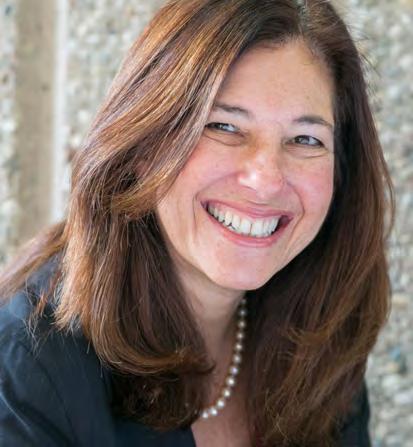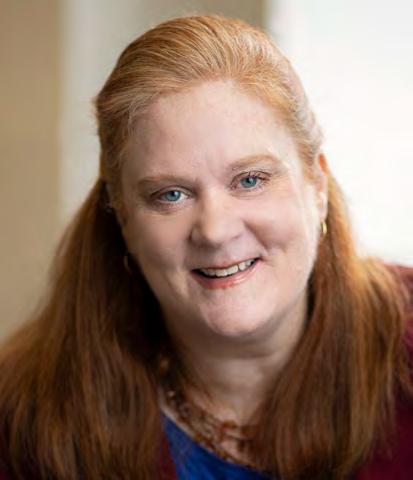
5 minute read
The Philip Foglia Summer Legal Internship
FACULTY
BY BRIDGET J. CRAWFORD & MICHELLE S. SIMON
The following excerpt is from Professors Bridget J. Crawford and Michelle S. Simon’s 2021 article, Law Faculty Experiences Teaching During the Pandemic, which was published in Saint Louis University’s Law Journal.
INTRODUCTION
When US law schools abruptly shifted to online teaching during the Spring 2020 semester, all attention (appropriately) was on our students. Most students did not enroll in law school in the Spring 2020 semester thinking they would be taking distance education classes, but soon they were. Professors, too, had to make changes— in some cases quite literally overnight—to keep law schools’ virtual doors open during the initial months of the coronavirus pandemic. Our anecdotal observation as faculty members teaching during the Spring 2020 semester is that colleagues nation-wide were very much focused on delivering an excellent education to our students with the least disruption possible, taking into account that many students lacked a quiet place to study, reliable internet, or access to a printer. Many students experienced physical and economic dislocation, faced health uncertainties for themselves or family members, or became full-time caretakers for children, siblings, sick parents, or other family members, all while trying to maintain a rigorous course load in law school.
Just a few weeks into the pandemic, one of us administered a survey of the ninety-nine students enrolled in our Corporations & Partnership class at the Elisabeth Haub School of Law at Pace University. The survey asked students about their access to technology, their study spaces, and what they wanted their professors and classmates to know. In an anonymous survey, students detailed the enormous emotional stress and upheaval they were experiencing. “Family members are sick and it can be very stressful,” one student explained. “Mental health-wise, my anxiety has been pretty bad,” another student revealed. “This is such a difficult time and most of my belongings are scattered across 3 states, including my means of transportation. It is increasingly difficult to study in a space that is not my own,” said another. Many students reported that they did not have reliable internet and did not have any privacy at home. In multiple emergency faculty meetings, we shared what we knew about students’ situations, and worked with school administrators to get emergency financial and other aid to students in need. Because of the extraordinary and involuntary shift to online legal education, our home institution—and most US law schools—adopted a variation on pass/fail grading for the semester.
Before the pandemic, each of us had different degrees of experience teaching online. Perhaps because of that experience we were less daunted than some of our colleagues who had never taught online. Even so, we admit that we found online teaching during the early months of the pandemic (and beyond, as the public health crisis continues) to be incredibly challenging. Throughout the Spring 2020 semester, we had the support of many wonderful local and national colleagues who were generous in sharing ideas and materials. Every single colleague we spoke with was focused foremost on creating conditions for students’ academic success in these unusual times. Very rarely, a colleague might confide that she felt “overwhelmed,” or joke that she was “losing it.” How were faculty members doing during the pandemic, we wondered. With all the focus on the students, was anyone focused on how the faculty was doing? Might it be perceived as selfish or self-indulgent to even ask how faculty members were doing?
At the end of the Spring 2020 semester, we sent a survey to sixty-one colleagues we thought might be Michelle S. Simon

Bridget J. Crawford
willing to share their experiences with online teaching by responding to a short survey of about twenty-three questions. The recipients included a few at our home institution; the others taught at schools around the country. The colleagues to whom we sent the survey taught at schools from New York to Florida to California and many states in between. The recipients taught at both private and public universities of every rank and distinction. The survey was anonymous and we indicated that we would not disclose to the general public the names of the recipients of the survey. With the initial email, we included a link to the survey, so recipients could share the survey with interested colleagues, which we encouraged them to do. We indicated that we would use the survey results as the basis for a series of blog posts and possibly a law review essay (this one). We received thirty-seven responses to the survey.
We cannot confirm the identity of those who completed the survey, and anyone with the link could have responded. Thus, the survey was not designed to be and cannot be interpreted to have any scientific validity at all. Even so, the responses in aggregate provide a snapshot of law faculty experiences teaching during the pandemic during the Spring 2020 semester. In presenting the results here, this essay suggests that faculty members experienced significant upheaval in their professional lives, and took measures to adapt their teaching to the new online environment. The essay organizes around six themes. Part I presents respondents’ self-reported data about their levels of teaching experience and home lives. Part II explores the methods of instruction that professors found effective before and after the switch to online education, and the level of faculty extracurricular engagement with students during the pandemic. Part III investigates faculty self-reported satisfaction with teaching online and asks faculty about their perceptions of student satisfaction with online education. In response to open-ended questions, faculty shared what they want their students to know (Part IV), what they want their colleagues to know (Part V), and what they want their deans and other administrators to know (Part VI). With these small (and unreliable) survey results in hand, law school faculty and administrators might choose to survey their own faculties to identify the types of particular support that faculty need during the pandemic. Support for faculty in online teaching (pandemic or not) ultimately will lead to a better experience for students. Asking others about faculty experiences is also a way administrators can express support and identify new bases for collaborative engagement. As one of the surveyed faculty members explained, “Empathy is a valuable tool to use and model.” n
For purposes of this excerpt, footnotes have been omitted.
The full version of this article was published in Saint Louis University’s Law Journal: 43 St. Louis L.J. 1 (2021).










